Archive
THE THIEF OF BAGDAD – Mortimer Wilson
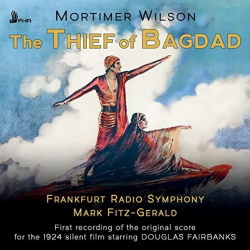 GREATEST SCORES OF THE TWENTIETH CENTURY
GREATEST SCORES OF THE TWENTIETH CENTURY
Original Review by Craig Lysy
In 1922 actor Douglas Fairbanks decided to move beyond his usual comedic films to take on the heroic role of Robin Hood. He enjoyed the role and was rewarded as the film ended up being a stunning commercial and critical success. Now emboldened, he decided to take on another swashbuckler hero based on the iconic epic ancient tale “The Thief of Bagdad”. This was a passion project and he used his own production company, Douglas Fairbanks Pictures, to finance production. He took personal charge of production, allocated an unprecedented $1.136 million budget, and also wrote the story on which the screenplay was based. Raoul Walsh was tasked with directing, and Achmed Abdullah and Lotta Woods were hired to write the screenplay. Fairbanks would star in the lead role as Ahmed, The Thief of Bagdad supported by Snitz Edwards as His Evil Associate, Charles Belcher as Iman The Holy Man and film narrator, Julianne Johnson as The Princess, Sojin Kamiyama as Cham Shang, and Anna May Wong as The Mongol Slave. Read more…
MODERN TIMES – Charles Chaplin
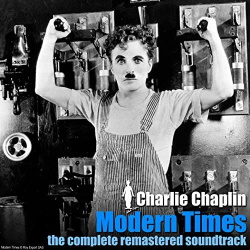 GREATEST SCORES OF THE TWENTIETH CENTURY
GREATEST SCORES OF THE TWENTIETH CENTURY
Original Review by Craig Lysy
Charlie Chaplin’s inspiration for the film Modern Times arose from the deplorable social and economic conditions that he found in Europe in the aftermath of the Great Depression. A personal conversation with Mahatma Gandhi about the negative effects of modern technology on people’s lives was also instrumental. In 1934 he began conceiving the film’s story, which would serve as his first ‘talkie’ film. However, he abandoned this and instead chose to make his last silent film with the Tramp character as he felt the universal appeal of him would be lost with dialogue. Once again he would oversee production, direct, write the screenplay, compose the music, and star in the film. Joining him would be Paulette Goddard as Ellen Petersen, Henry Bergman as the café proprietor, Stanley “Tiny” Sanford as Big Bill and Chester Conklin as the Mechanic. Read more…
CITY LIGHTS – Charles Chaplin
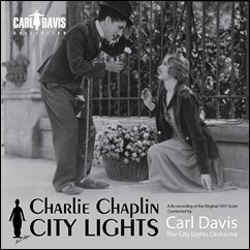 GREATEST SCORES OF THE TWENTIETH CENTURY
GREATEST SCORES OF THE TWENTIETH CENTURY
Original Review by Craig Lysy
Entering the 1920s Charlie Chaplin had become a global sensation, his career ascendent. In 1929 he conceived a new film, “City Lights”, a passion project in which he would produce, direct, write the screenplay, compose the score, and star. Chaplin was a perfectionist and it would take him 534 days of filming to realize his vision. He faced significant resistance from his studio United Artists who were not happy with his decision to eschew a talkie film, and instead stubbornly make another silent film, although one with a synchronous and original score. For Chaplin, his art and passion was pantomime, with his Tramp character beloved by the world and legend. He saw talkie films as a harbinger for the end of his art, and so his reaction was understandable. And so, he proceeded with his vision and a budget of $1.5 million dollars was provided. The cast included Chaplin as the Tramp, Virginia Cherrill as the blind Flower Girl, Florence Lee as the grandmother, Harry Myers as the eccentric millionaire, Al Ernest Garcia as the butler, and Hank Mann as the prizefighter. Read more…
THE HOLY MOUNTAIN – Edmund Meisel
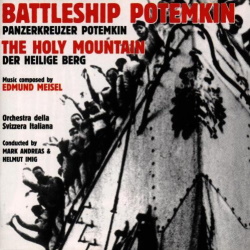 GREATEST SCORES OF THE TWENTIETH CENTURY
GREATEST SCORES OF THE TWENTIETH CENTURY
Original Review by Craig Lysy
In 1926 the future documentary filmmaker (and Nazi propagandist) Leni Riefenstahl was a dancer and an aspiring actress. A chance meeting between her and director Arnold Fanck was fateful as he was impressed by both her beauty and singlemindedness. As such, he began to write sketches to a film he envisioned, a love story, which would showcase her talents. Fanck took his screenplay – called Der Heilige Berg, or The Holy Mountain – to the UFA production company, who agreed to support the project. Harry R. Sokal was assigned production with a budget of 1.5 million RM. Fanck would direct and handle cinematography. His cast consisted of Riefenstahl as Diotima, Luis Trenker as Karl, Frida Richard as Mother, Ernst Petersen as Vigo, Friedrich Schneider as Coli, and Hannes Schneider as Mountain Guide. Read more…
CARMEN – Ernesto Halffter
 GREATEST SCORES OF THE TWENTIETH CENTURY
GREATEST SCORES OF THE TWENTIETH CENTURY
Original Review by Craig Lysy
Director, screenwriter and actor Jacques Feyder had two dozen films to his credit when he decided to bring Prosper Mérimée’s classic 1845 novel Carmen to the big screen. Georges Bizet had in 1875 made the story famous with his opera, but Feyder felt confident that he could provide a big screen retelling, which would reach far more people. Alexandre Kamenka’s production company signed on to fund the project with Les Films Armor agreeing to distribute. Feyder personally adapted the novel into a screenplay and would also direct the film. He made the artistic decision to film live in authentic locations rather than the insular comfort of the studio sets. He brought in a fine cast, which included; Raquel Meller as Carmen, Fred Louis Lerch as José Lizarrabengoa, and Gaston Modot as García “El Tuerto”. Read more…
THE BIRTH OF A NATION – Joseph Carl Breil
 GREATEST SCORES OF THE TWENTIETH CENTURY
GREATEST SCORES OF THE TWENTIETH CENTURY
Original Review by Craig Lysy
In 1913 Director D. W. Griffith took interest in the 1905 novel The Clansman by Thomas Dixon Jr. and believed it provided an opportunity to bring an epic tale to the big screen. He secured the film rights offering 25% interest in the film and would use his own production company to produce the film, with an initial budget of $10,000, which later ballooned to $100,000. Griffith would not only produce the film, but also direct, and collaborate with Frank E. Woods to write the screenplay. Casting caused controversy as Griffith used white actors in black face to play black and mulatto people, and only used real black people in expansive scenes where extras were required. For his cast Lilian Gish would star as Elsie Stoneman, and joining her would be Mae Marsh as Flora Cameron, Henry B. Walthal as Colonel Benjamin Cameron, Miriam Cooper as Margaret Cameron, Ralph Lewis as Austin Stoneman, George Siegmann as Silas Lynch, and Walter Long as Gus. Read more…
STENKA RAZIN – Mikhail Ippolitov-Ivanov
 GREATEST SCORES OF THE TWENTIETH CENTURY
GREATEST SCORES OF THE TWENTIETH CENTURY
Original Review by Craig Lysy
The short silent film’s genesis arose from a collaboration between two pioneers of the emerging 20th century Russian cinema; producer/cinematographer/correspondent Alexander Drankov, and director Vladimir Fedorovich Romashkov. Following the 1905 Russian revolution the country was simmering with worker and peasant discontent against the autocracy of Tsar Nicholas II and the aristocracy. In an effort to tap into public discontent, they conceived of a fictionalized account from the life of Stenka Razin, a heroic 19th century Cossack chieftain who led a peasant revolt against the oppression of the Tsar and landed nobility. The 10-minute short film would be financed by Drankov’s own production company, which he formed the year before in 1907. The screenplay was written by Vasily Goncharov, and is an adaptation from the play Ponizovaya Volnitsa. A single actor is credited, Yevgeni Petrov-Krayevsky who would play Stenka Razin. Read more…
DIE NIBELUNGEN, PART II: KRIEMHILD’S REVENGE – Gottfried Huppertz
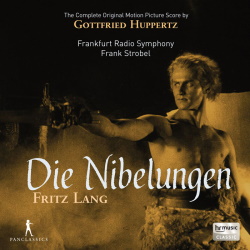 GREATEST SCORES OF THE TWENTIETH CENTURY
GREATEST SCORES OF THE TWENTIETH CENTURY
Original Review by Craig Lysy
Austrian director and screenwriter Fritz Lang had long desired to bring a grand fantasy adventure film to the big screen. He eventually found inspiration in the epic 12th century Germanic poem Die Nibelungenlied. He collaborated with his wife Thea von Harbou in writing the screenplays for a two-part series that would be titled Die Nibelungen: Siegfried and Die Nibelungen: Kriemhild’s Revenge. The German production company Decla-Bioscop agreed to produce and fund the film, with UFA overseeing distribution. For Lang this was a passion project, and he assembled one of the finest casts ever assembled, which included; Paul Richter as King Siegfried of Xanten, Margarete Schon as Kriemhild of Burgund, Hanna Ralph as Queen Brunhild of Isenland, Bernhard Goetzke as Volker of Alzey, Theodor Loos as King Gunther of Burgund, Rudolf Klein-Rogge as King Etzel, Rudolf Rittner as Margave Rüdiger of Bechlam, Hans Adalbert Schelettow as Hagen of Tronje, Georg August Koch as Hildebtandt, Georg John as Mime the Goldsmith/Albert the Dwarf/Blaodel, Getrud Arnold as Queen Ute of Burgund, Hans Carl Müller as Gerenot of Burgund, Erwin Biswanger as Giselher of Burgund, Fritz Alberti as Dietrich of Bern, and Annie Röttegen as Dietlind of Bechlam. Read more…
DIE NIBELUNGEN, PART I: SIEGFRIED – Gottfried Huppertz
 GREATEST SCORES OF THE TWENTIETH CENTURY
GREATEST SCORES OF THE TWENTIETH CENTURY
Original Review by Craig Lysy
Austrian director and screenwriter Fritz Lang had long desired to bring a grand fantasy adventure film to the big screen. He eventually found inspiration in the epic 12th century Germanic poem Die Nibelungenlied. He collaborated with his wife Thea von Harbou in writing the screenplays for a two-part series that would be titled Die Nibelungen: Siegfried and Die Nibelungen: Kriemhild’s Revenge. The German production company Decla-Bioscop agreed to produce and fund the film, with UFA overseeing distribution. For Lang this was a passion project, and he assembled one of the finest casts ever assembled, which included; Paul Richter as King Siegfried of Xanten, Margarete Schon as Kriemhild of Burgund, Hanna Ralph as Queen Brunhild of Isenland, Bernhard Goetzke as Volker of Alzey, Theodor Loos as King Gunther of Burgund, Rudolf Klein-Rogge as King Etzel, Rudolf Rittner as Margave Rüdiger of Bechlam, Hans Adalbert Schelettow as Hagen of Tronje, Georg August Koch as Hildebtandt, Georg John as Mime the Goldsmith/Albert the Dwarf/Blaodel, Getrud Arnold as Queen Ute of Burgund, Hans Carl Müller as Gerenot of Burgund, Erwin Biswanger as Giselher of Burgund, Fritz Alberti as Dietrich of Bern, and Annie Röttegen as Dietlind of Bechlam. Read more…
BATTLESHIP POTEMKIN – Edmund Meisel
 GREATEST SCORES OF THE TWENTIETH CENTURY
GREATEST SCORES OF THE TWENTIETH CENTURY
Original Review by Craig Lysy
In 1925 the Soviet Central Executive Committee directed the People’s Commissariat for Education to organize a celebration to commemorate the 20th anniversary the first Russian Revolution of 1905. A patriotic film that revealed the corruptness of the former Tsarist regime while espousing the ideals of Socialism was envisioned to be integral to the celebration. As such Nina Agadzhanova was tasked with writing the screenplay, Sergei Eisenstein was assigned to direct, and Mosfilm would oversee its production. Agadshanova’s original script explored a broad narrative comprising several topics, which covered the totality of the uprising, however Eisenstein significantly narrowed the scope of the film, focusing its narrative on the now legendary mutiny aboard the battleship Potemkin. The film would star Aleksandr Antonov as Grigory Vakulinchuk, Vladimir Barksy as Captain Evegeny Golilov, and Grigori Aleksandrov as Chief Officer Giliarovsky. Read more…
RAPSODIA SATANICA – Pietro Mascagni
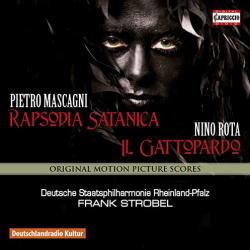 GREATEST SCORES OF THE TWENTIETH CENTURY
GREATEST SCORES OF THE TWENTIETH CENTURY
Original Review by Craig Lysy
Italian playwright, screenwriter and film director Nino Oxilia found inspiration for his next film in legendary character Faust, for which he would provide a twist – retelling the story with Faust cast as a woman. He chose to utilize poems by Fausto Maria Martini who was a member of ‘Crepusscolari”, the ‘Poets of Twilight’. The works of these artists were tragedies, which spoke of the decline of the shallow bourgeois culture. Oxilia purchased the film rights, and Società Italiana Cines agreed to produce and fund the film with a budget that allowed Oxilia to realize his vision. Oxilia spared no expense for his passion project, hiring the leading actress of her generation, prima diva Lyda Borelli who was beloved by Italians, to star in the film. He tasked poet Fausto Maria Martini to provide the film’s closed captions, used elaborate costumes and jewelry, and lastly, added color, both tinted and toned, as well as stenciling to create film imagery that expanded beyond the limited confines of black and white. Read more…
SALAMMBÔ – Florent Schmitt
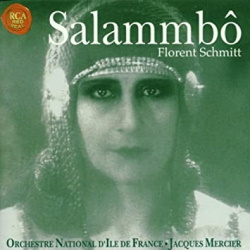 GREATEST SCORES OF THE TWENTIETH CENTURY
GREATEST SCORES OF THE TWENTIETH CENTURY
Original Review by Craig Lysy
In 1924 French film producer Louis Aubert and director Pierre Maradon were researching a story for their next film. They were greatly impressed by the historical novel Salammbô by Gustave Flaubert and decided to bring its sprawling story to the big screen. Arnold Pressburger was given the reins to produce the film with Aubert’s production company Gaumont-Franco Film-Aubert funding the project. Gustave Flaubert was hired to adapt his novel and write the screenplay. Maradon was tasked with directing and selected a cast including Jean de Balzac as Salammbô, Rolla Norman as Mâtho, as Victor Vina as Hamilcar Barca, Raphaël Lievin as Havas, Henri Baudin as Spendius, and Adolf Weisse as Scharabaim. Read more…
L’ASSASSINAT DU DUC DE GUISE – Camille Saint-Saëns
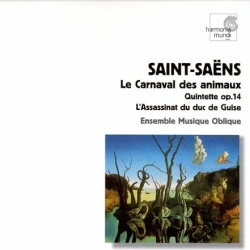 GREATEST SCORES OF THE TWENTIETH CENTURY
GREATEST SCORES OF THE TWENTIETH CENTURY
Original Review by Craig Lysy
During the 1880s a technological revolution occurred with the invention of celluloid photographic film and motion picture cameras. The first public screening of a motion picture in which an admission fee was charged occurred in New York City 1895 by the Lambda Company, founded by Woodville Latham. The idiom quickly gained popularity, and in 1907 Paul Lafitte, a wealthy novelist, publisher and financier founded the French production company Le Film d’Art to produce French films, which he hoped would gain the admiration of the cultural elite as well as the patronage of the common people. Throughout his life Lafitte had been tireless in fostering literature and the theatre. He saw motion pictures as a new way to bring education and entertainment to the masses. He recruited talented stage actors from the Comédie-Française theatre group, and in 1908 decided to produce his first film, the French historical drama L’Assassinat du Duc de Guise originally titled La Mort du Duc de Guise. The Pathé Frères company would distribute the film, and he tasked French actors Charles le Bargy and André Calmettes to direct. French dramatist Henri Lavedan was hired to write an original screenplay, and a fine cast was assembled, which included Charles le Bargy as King Henry III, Albert Lambert as Le Duc de Guise, Gabrielle Robinne as Marquise de Noirmoutier and Berthe Bovy as Le Page. The final product was a short film of 18 minutes. Read more…
WINGS – J. S. Zamecnik
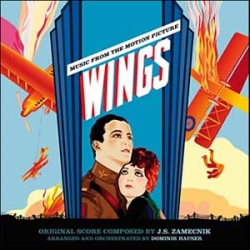 GREATEST SCORES OF THE TWENTIETH CENTURY
GREATEST SCORES OF THE TWENTIETH CENTURY
Original Review by Craig Lysy
John Monk Saunders served in the US Air Corp during WWI as a flight instructor in Florida. He had lifelong regrets that he was never able to serve his country in combat, and so conceived a story, which would allow him to realize that ambition in film. He pitched his idea to producer Jessie Lasky who was unreceptive due to the logistics required to film aerial combat. Yet Saunders would not be denied and secured support from the War Department, which included 220 planes, and airmen, artillery, tanks, trucks and troops. Lasky was impressed and decided to proceed with his Famous Players-Lasky company financing the project and Paramount Studio securing distribution rights. A massive budget of $2 million was budgeted and Louis Lighton and Hope Loring were hired to write the screenplay. Lasky and four others would produce the film, and William Wellman was tasked with directing as he was the only director in Hollywood who had actual combat pilot experience. Securing a cast was an adventure however when Paramount’s greatest star Clara Bow, demanded a rewrite stating “Wings is a man’s picture and I am just the whipped cream on top of the pie”. Her demands were met and the story evolved into a war time romance. She would star as Mary Preston, with Charles “Buddy” Rogers as Jack Powell, Richard Arlen as David Armstrong, Gary Cooper as Cadet White, and Jobyna Ralston as Sylvia Lewis. Read more…
METROPOLIS – Gottfried Huppertz
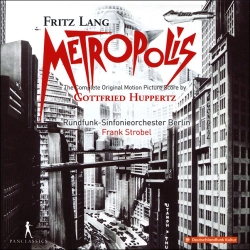 GREATEST SCORES OF THE TWENTIETH CENTURY
GREATEST SCORES OF THE TWENTIETH CENTURY
Original Review by Craig Lysy
Director Fritz Lang had early access to his wife Thea von Harbou’s 1925 novel Metropolis, and was inspired to bring its bold futuristic social commentary to the big screen. The couple worked together to fashion the screenplay and secured financing from the German production company WFA and the German distribution company Parufamet, which was created by investment from Paramount and MGM studios. He pitched his screenplay to Erich Pommer, the most powerful film producer in Germany of the time, and secured his backing to produce the film. A fine cast was assembled which included Alfred Abel as the Master of Metropolis Joh Fredersen, Gustav Fröhlich as Joh Fredersen’s son, Rudolph Klein-Rogge as Rotwang the inventor, and Brigitte Helm as the unforgettable Maria. The film’s narrative offers a potent social commentary, which is set in the far future in the great city of Metropolis. The society is dystopian with an elite ruling class of capitalist industrial oligarchs who live above ground in luxurious skyscrapers and hold power over a lower working class who live impoverished underground, toiling endlessly to operate and maintain the great machines that power the city. They share not in the profits, nor any of the benefits, which go solely to the ruling elite. Freder, who is the son of the Master of Metropolis, bears witness to the misery of the working class and resolves to advocate for them. Freder meets a worker prophetess named Maria who foresees the arrival of a Mediator who will unify the workers and ruling elite of Metropolis in a new Utopia. He falls in love with Maria and aspires to assume the role of Mediator. Against this backdrop the evil inventor Rotwang creates a robot bearing Maria’s likeness to foment dissent and revolution, which will bring him to power. In the end, after much intrigue and fighting, Freder kills Rotwang and fulfills his role as Mediator. Read more…

